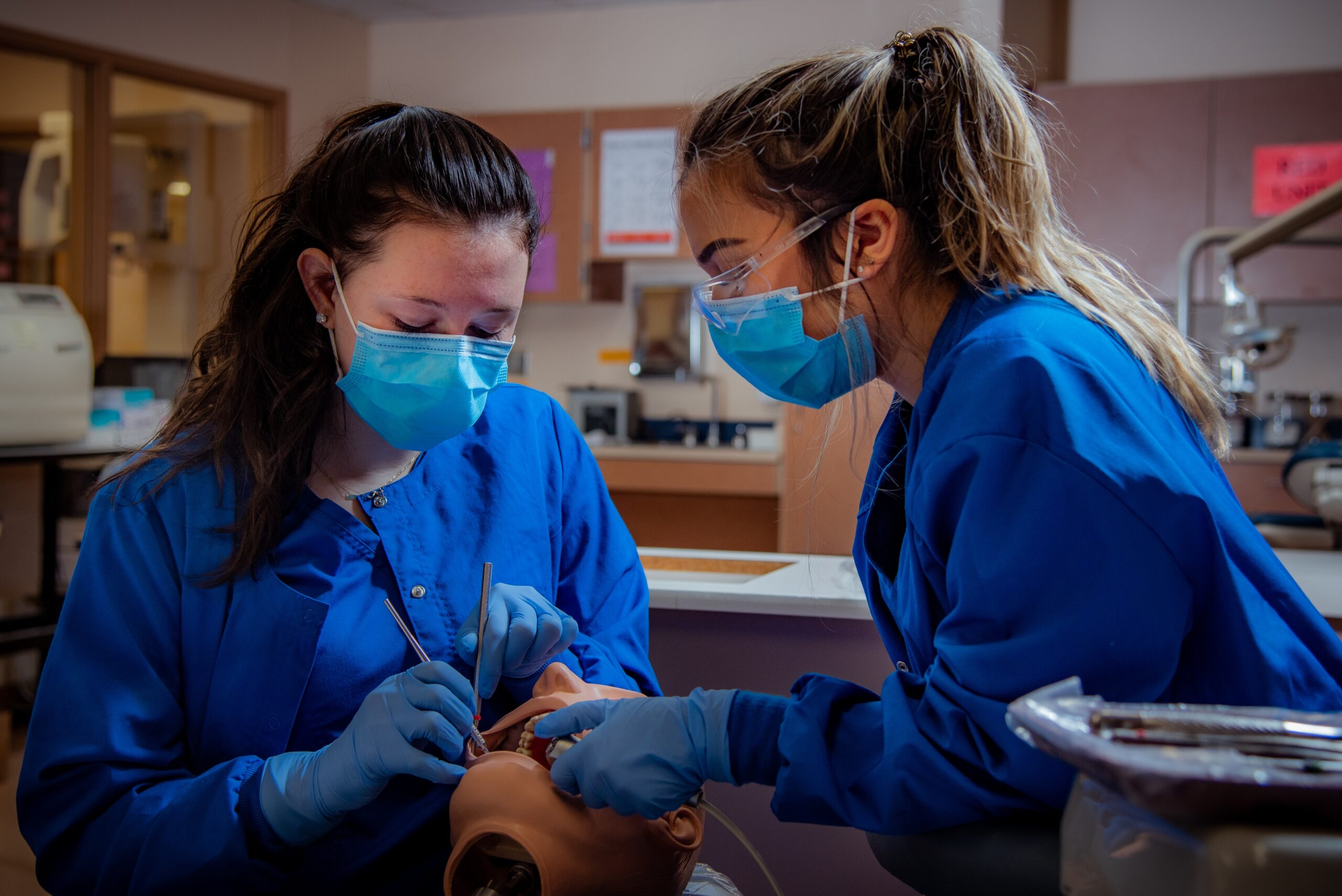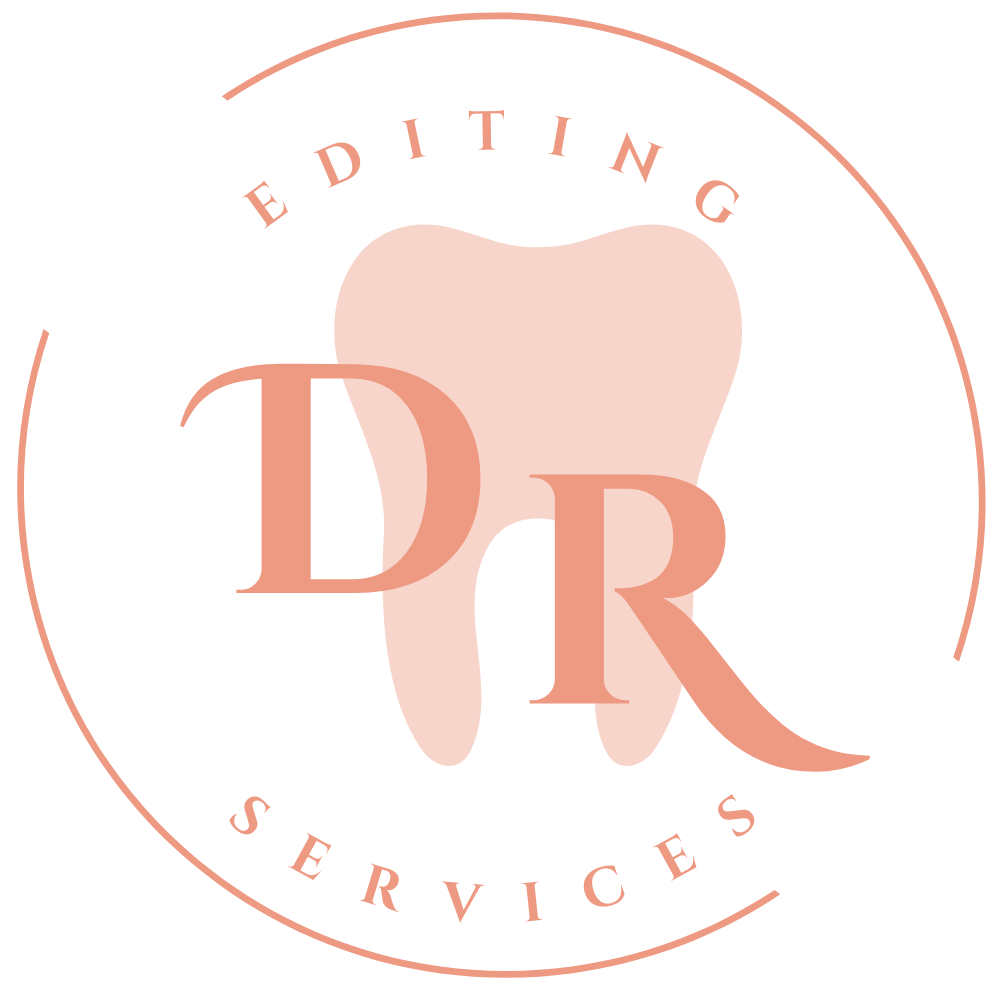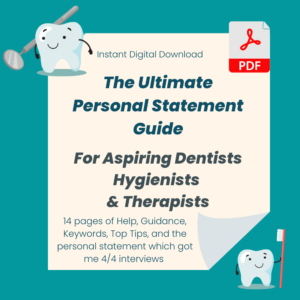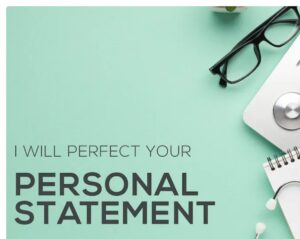
What Makes A Good Personal Statement For Dentistry
Are you struggling to write your personal statement?
Don’t know where to start or what to include?
It is incredibly tough to write a personal statement without overthinking it. You have to boast about your experiences while also being modest. You’re expected to provide an insight into your thoughts and creatively reflect on your key experiences. This is why I have created the perfect guide to help you.
How will this help you with your dental personal statement?
This article will focus on what makes a good personal statement for dentistry applicants. However, you can apply the same points to any field of healthcare – medicine, optometry, pharmacy, physician associate, nursing, dental hygiene, etc… If you haven’t written your first draft, I recommend reading my guide on How To Structure Your Statement first, then come back here.
There will be three real dental personal statement examples used. These are from friends or students I have worked with. I include the outcome of their application & I have also included a breakdown of the positives, negatives and a general overview of the personal statement. This will show you what is expected in a dental personal statement and how you can improve yours. It will also highlight red flags and how to avoid an immediate rejection.
Introducing the Ultimate Dental Personal Statement Guide: Your Pathway to Success!
The Dental Personal Statement Guide is here to help you craft an outstanding dental personal statement that will impress admissions committees and get you one step closer to achieving your dreams.
Packed with insider knowledge, top tips, a winning strategy, keywords, and the Dental Personal Statement that got Dr. Radhika all of her interview invitations, this guide is your secret weapon to stand out from the crowd.
Contents
- Excellent dental personal statement example
- Good dental personal statement example
- Poor dental personal statement example
Successful - Top Dental Personal Statement Example
Outcome:
4 interview invites- Bristol, Cardiff, QMUL, Sheffield
“Shadowing an orthodontist and general dentist was the deciding factor in my decision to pursue dentistry. I was in awe of the ability to move teeth rooted in the bone to create a more aesthetic and functional result. Previously, I naively thought of orthodontics as a simple method of moving teeth. Having attended my orthodontic consultation, I was given various treatment options, and the risks and benefits were discussed in detail. However, I refused treatment. Why? I did not want visible metal braces. My teeth never bothered me. The day they did bother me was when I was sixteen years old – in agony over a toothache. I was warned this could happen following my deep filling, but no one warned me that the pain would be this bad. The future of that tooth led to this application.
At sixteen, I was at a pivotal stage of my life, where I was considering potential careers that aligned with my personality and goals. I was drawn to healthcare and eager to have my own patients and be practical. Following various work experiences at optometry clinics, Boots pharmacy, and a dental clinic. I was most enthusiastic about dentistry. It was the combination of artistic elements that intertwined with the sciences. An ability to care for a patient from the beginning of their journeys and be a part of their transformation. I observed patients being given their dentures, having crowns fitted, and composites placed. I recognised there were many ethical challenges involved and patients frustrated from their pain.
The general dentist I shadowed remained calm, composed and almost far too familiar with such challenges. She shared that this has developed from many years of treating the diverse community. I acquired experience volunteering in a care home to gain insight into helping my local community. I engaged in conversations with those who have dementia. It was challenging to think of exciting activities when they struggled with simple tasks. We settled on crosswords, and this, too, brought obstacles but also many laughs. I am now more aware of the difficulties faced by vulnerable patients and their families. I conversed with those of various ages, backgrounds, and levels of deterioration. Akin to dentistry, one must communicate with many patients who may not understand their dental issues.
My commitment to the care home was followed by weekly volunteering with St. John Ambulance. A gratifying experience where I liaised with team members, leaders, and the public to ensure first aid was provided to those in need. My regular training involved basic life support, I thrived here as I was eager to learn about the physiology behind medical emergencies. This, in addition to the practical nature of the role, appealed to me. On event days, I would attend with my team and attend to those with minor injuries. Compassion was integral to being a candidate for St. John Ambulance.
I felt I lacked hands-on experience; hence, I attended a dental materials course at Queen Mary’s University. I used alginate and gypsum to create and adjust moulds. Also, I was able to speak to dental students at the school, and they gave me their perspectives on dentistry. They shared the challenging aspects of NHS dentistry but were keen to advocate for holistic and ethical care. I admired their integrity and honesty about working for the NHS. Nevertheless, I desire a practical role where I can make a difference in one’s oral health through education and ethical treatments. I understand that dentistry is highly fulfilling and a dynamic role with high targets causing immense pressure. I hope my coping mechanisms will aid me through this process, and I hope to acquire a position at your university. I have proven my willingness to serve others, care for the elderly, and I am well aware of the roles of a dentist. If admitted, I will strive to offer quality care and remain committed to serving others.”
Positives:
- Well-structured and written
- Straight to the point and includes an anecdote in the introduction
- Differentiated dentistry from other professions through various work experiences
- Specifies procedures observed and reflects on the positive and negative aspects of dentistry
- Acknowledges ethical challenges and effects of dental pain
- Volunteered with elderly patients and with St. John Ambulance
- Leadership, teamwork, communication, and empathy implied throughout
- Show not tell technique used effectively
- Scope of the role understood
Negatives:
- Introduces toothache in the introduction but does not expand on this key experience
- Introduces topic of high targets and coping mechanisms in the conclusion
- Does not mention hobbies and life outside of education
Overview
This dental applicant first came to me with a poorly worded draft and it was clear that they had huge potential. I helped this student by extensively editing their personal statement. The introduction grips the reader and tells us the applicant’s motivations straight away. The dental personal statement is concise and discusses the student’s journey toward this application. The numerous work experiences and voluntary roles are discussed in-depth, and each is reflected on. Unfortunately, we chose to exclude hobbies from the statement due to character limits. Overall, the student does an excellent job of relating their experiences back to dentistry throughout the personal statement and comes across as a well-rounded and empathetic individual.Dr. Radhika’s Personal Statement Editing Service is here to rescue you. Her expertise can effortlessly transform your dental personal statement, bringing your unique story to life.
From filling in any missing content to perfecting every aspect, Dr. Radhika will ensure that your personal statement stands out from the crowd!
Successful - Good Dental Personal Statement Example
Outcome:
1 interview invite- Cardiff 3 rejections – Kings College London, Queen Mary University London, Sheffield
“Braces were the bane of my life. It felt as if I had them on for many years and was tired of the constant jokes about my metal teeth. This all came to an end when I had them removed. My orthodontic treatment changed my perspective on life. My family noticed the immediate change in my confidence, and I felt much more comfortable eating and smiling in public. These simple changes to my life dramatically improved my quality of life at school. I truly appreciated my orthodontist’s work, and this experience drew me to the field of dentistry.
I have always been a problem-solver, figuring out solutions through trial and error. I enjoy fixing computers in my spare time and handling small pieces of equipment while soldering. This was further improved during my tech classes, where I took woodworking. I found that these hobbies of mine aligned with a career in dentistry. I had previously considered engineering, but I felt the role lacked the direct impact I could have on patients’ lives. Biology was my favourite subject, which taught me the basics of anatomy, homeostasis, and biochemical processes. My A-Levels taught me to break down complex topics and learn them in bite-sized chunks. This really helped me to tailor my studying methods to suit me. Chemistry practicals improved my dexterity and ability to handle delicate equipment and improved my accuracy during titrations.
I have read a lot about dentistry through learning about medical ethics. I understand that healthcare brings unique challenges and was particularly intrigued by the Montgomery Case. This intrigued me about the need to be open with patients and be sincere when discussing the risks and benefits of a treatment. After all, it is their care that they trust clinicians with. This ties in with the four pillars of medical care and not causing harm to patients. I became more familiar with this concept during my hospital work experience. I was not directly involved in the hands-on care, but I could observe various procedures and consultations with patients. I was impressed by the dentist’s ability to explain the causes behind decay and gum disease while also being mindful of not exacerbating patient anxiety.
I was eager to touch upon my ability to manage patients. However, I could not access many voluntary opportunities during COVID. Instead, I began working as a COVID volunteer, reaching out to those who were suffering and unable to obtain groceries or care for their dogs. I regularly walked the dogs and collected groceries for the COVID sufferers. Those I helped lived alone and were socially isolated. I developed my communication through helping to get groceries and collaborated with my team to improve our service in reaching out to those in need.
Apart from my volunteering, I play doubles tennis and must work well with my team member. This has taken many years to develop, and I am used to being a team player and a leader when I identify weaknesses that can be improved. I highly respect my tennis partner, and we have learned to motivate each other and praise one another for our strengths and celebrate our achievements. In dentistry, I hope to do the same by encouraging my team, ensuring we all share the same mutual goal of providing quality care and boosting morale during challenging days.
My path toward dentistry has genuinely been enjoyable. My A-levels were challenging but improved my biological understanding and encouraged me to read outside the subject. It was my orthodontic experience and shadowing that truly opened my eyes to the impact that dental care can have on self-confidence. Hence, I hope to provide the same level of care to those I treat in the future. I have continually aimed to show empathy to those around me and hope this continues in the future as I aspire to be a well-rounded and ethical general dentist.”
Positives:
Negatives:
Overview:
After initially reading the personal statement, it looks pretty well-written and introduces unique topics that make the applicant stand out. The student demonstrates a good understanding of dentistry’s ethical side, which gives them brownie points. Despite this, the applicant received 3 rejections.Why?
The applicant did not expand on their work experience enough and there was limited reflection throughout the statement. They also lacked caring roles and more interactive volunteering experiences. They also wasted characters by mentioning their A-levels – this isn’t necessary and it doesn’t differentiate you from others. Overall, the statement isn’t bad, but it shows the need for varied volunteering experiences and an ability to reflect on these. Reflection is a big part of dentistry as lifelong learning is expected.

Unsuccessful - Poor Dental Personal Statement Example
Outcome:
4 rejections 0 interview invites
“Ever since I was a child, I have wanted to become a dentist from the moment I lost my primary teeth. My parents always supported me in my decisions and took care of my dental health. I still remember the excitement of waiting for the tooth fairy and looking forward to each dental visit. Now that I am much older, I realise that dentistry involves far more than simply counting the number of teeth. There is a whole field dedicated to oral health, and dentists are the specialists in this advancing profession. Many patients don’t know anything about oral health, leading to lots of cavities and dental treatment. I learned this during my work experience at an NHS clinic and wished to make a difference by educating the public.
There would be many patients with fewer cavities and children with lower rates of general anaesthetic appointments if there were targeted oral hygiene programs. Encouraging just five minutes of brushing time a day could significantly change one’s dental condition. The dentist I shadowed made an extra effort to educate her patients. She began every consultation by asking about their hygiene habits and would not hesitate to teach basic brushing techniques. I found patients listened attentively, especially following an examination where they were informed about their deteriorating dental health. The dentist showed empathy and excellent communication skills.
Dentistry has drawn me in as it stands out from medicine. It is a specialised field from the get-go. It involves general medical knowledge while specialising in an area often neglected by the public. The teeth are unique in that their anatomy is unlike any other part of the body. It requires regular cleaning and can be extracted or treated when infected. We can live without teeth, but can we comfortably enjoy a good life without them?
From seeing my grandfather remove his dentures every night and unable to eat meat, I recognise the impact this has had on his diet and happiness. He was a chef in his younger years and often struggles with wearing his ill-fitting dentures. He suffers from unusual anatomy and has been unable to seek specialist care. I aim to one day make a difference by creating a special pair of false teeth adapted to his mouth.
Going to a Summer School at City University allowed me to understand different healthcare opportunities. Optometry, medicine and pharmacy showed great potential for mixing theoretical knowledge with daily consultations and helping patients. This did not leave me feeling excited, I preferred the analytical and practical nature of dentistry. The chance to be very hands-on in carrying out the treatment, as well as liaising with other medical professionals. Dentists also have a much more appealing 9-5 schedule, flexibility with working hours and chances to specialise. I am also drawn to the financial side, which would be a bonus.
Hand-eye coordination has been vital throughout my Fine Art GCSE, where I achieved a high grade from using various mediums. I enjoy building a piece up from simple materials. I am highly inspired by the abstract works of Picasso and aim to re-create paintings with my own twist. I hope that my art will help me with the fine motor skills required when carrying out procedures such as crown preparation.
Overall, I hope to become a dentist who can carry out cosmetic work, while also fixing dental decay. I wish to reach out to populations that struggle with accessing care and hope to volunteer by helping them with their oral health. Oral health education is essential in making a difference on a public level, and I wish to be a part of that change.”
Positives:
- Understands some of the roles that dentists have as educators
- Recognises the importance of prevention and wants to incorporate that into their work
- Explains why they have chosen dentistry and not another field in healthcare
- Understands the impact of losing teeth on quality of life
- Summer school experience gained to compare different fields
- Manual dexterity mentioned and related to dentistry
Negatives:
- Lacks volunteering – the main reason for the rejection
- The first few sentences do not grip the reader, sound cringe and are poorly written
- It is incredibly cliché to write about wanting to study only one thing since childhood
- Mentioning the hours and money bonus is a red flag
- No experience in serving the community/ charity work
- Does not reflect enough on personal experiences
- Lack of leadership positions & teamwork
- Introduces new topics into the conclusion





